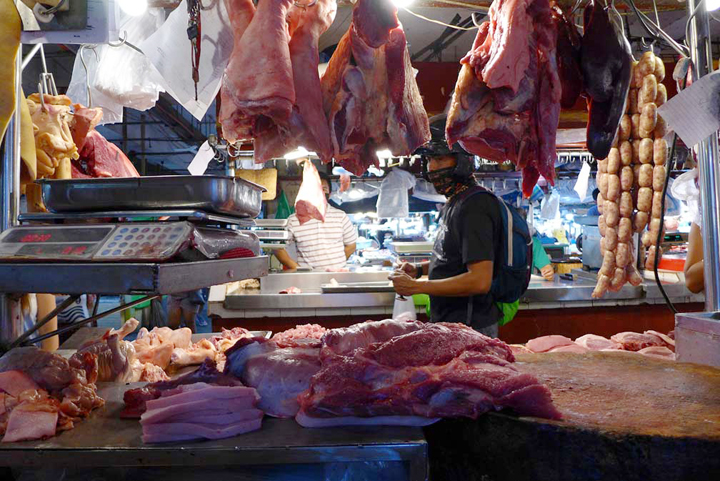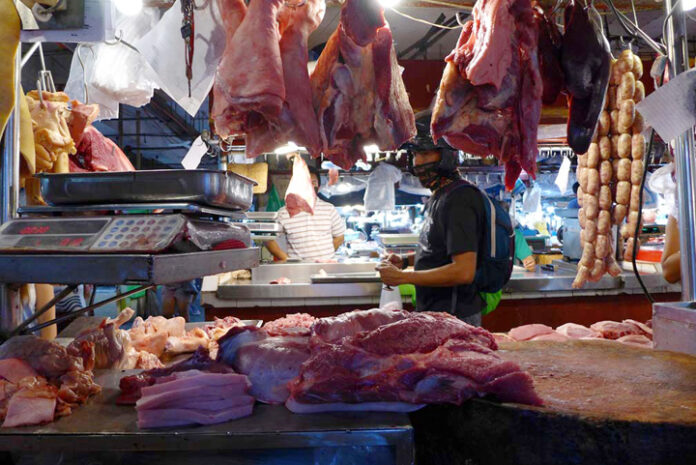
PRICES of local meat products may increase by as much as 20 percent —on a staggered basis over the next eight months—as processors start to use more expensive raw materials due to depleting stockpiles and thin volumes of imported supply.
The Philippine Association of Meat Processors Inc. (Pampi) said the industry has “used up” all of its lower-priced mechanically deboned meat (MDM) of chicken supply and has started to use the ones bought at $1.2 per kilogram to $1.4 per kilogram price tag since mid-May.
“We can no longer absorb the impact to our cost. By June onwards, [chicken MDM] arrivals will be at $1.50 [per kilogram] to $1.60 [per kilogram],” Pampi Vice President and CDO Foodsphere Inc. President Jerome D. Ong told the BusinessMirror.
“Processors will have to increase prices by 15 [percent] to 20 [percent] to stay afloat,” Ong added.
Ong explained that the increase in their prices would not happen overnight but stretched in increments of 3 percent to 5 percent in the course of the next six to eight months.
The staggered increase in prices would provide sufficient elbow room for both meat processors and the government to work out solutions to ease chicken MDM supplies.
Dar: Helping Pampi
Sought for comment, Agriculture Secretary William D. Dar told the BusinessMirror they “have been helping” Pampi “and will continue to assist without sacrificing quarantine regulations.”
“We allowed the Netherlands following the concept of unaffected regional areas on avian flu,” Dar said via SMS.
The prices of chicken MDM, particularly those from Brazil and North America—the ones currently available to the Philippines—have skyrocketed to $1.6 per kilogram, more than thrice its $0.5 per kilogram price last year.
Behind the price surge is a simple fact: local meat processors are now at the mercy of North American and South American suppliers who know that Europe cannot yet export to the Philippines due to existing temporary import bans.
“Just so that our margins do not completely collapse while working on easing MDM supply which in turn stabilizes prices. Then we stop increasing or even rollback to precrisis levels, if MDM prices go back to below precrisis levels,” he said.
In March, the BusinessMirror broke the story on rising chicken MDM prices threatening the local meat processing industry, with Pampi warning they could run out of low-cost priced MDM stocks in two months.
At present, Ong estimates that the industry’s chicken MDM inventory ranges from 30 days to 45 days.
Industry players have noted that the rise in MDM price offset the economic benefits from the lower 5- percent tariff on the imported raw material. The industry’s situation is also worsened by the persisting global shipping problems that delayed shipments for many months.
Due to this situation, several Pampi member-companies had filed price increase petitions with the Department of Trade and Industry (DTI) for products that are classified as Basic Necessities & Prime Commodities (BNPC)—mostly canned meat products.
The local meat processing industry has been scrambling to look for raw material, particularly from Europe, which accounts for 60 percent of the country’s annual chicken MDM imports. Pampi has been talking to DA to ease import bans slapped on European countries with reported avian influenza outbreaks.
In April, the DA allowed meat processors to import chicken MDM from bird-flu free areas in the Netherlands subject to what the industry deemed stringent conditions.
Pampi has said that Dutch poultry product exporters are reluctant to export chicken MDM to the Philippines due to its “born-and-bred condition.” Imports of chicken MDM from the Netherlands must come from poultry that were hatched and raised in bird-flu free areas in the European country.
The Netherlands alone accounts for about 40 percent of total Philippine chicken MDM supply.
“It simply doesn’t work that way in Europe because it is a contiguous land mass and it is not uncommon for livestock to cross borders, of course subject to stringent measures to prevent disease from spreading, in case there is,” Ong said.
Due to this, Pampi has sought the easing of the country-wide import ban slapped on the United Kingdom and Germany. Pampi argued that if it is allowed to import MDM from the UK, then there is a “good chance” that “UK producers may be able to supply some volumes” to the industry.
The BusinessMirror broke the story this week that meat processing companies, whether small or big players, have started to limit their product distribution in the market given the lack of raw material supply. (Related story: https://businessmirror.com.ph/2021/05/25/less-than-45-days-will-hotdogs-soon-be-hard-to-find/)
Industry sources told the BusinessMirror certain brands of hotdogs and canned meat products are now absent from supermarket shelves while other companies are not anymore selling in the Visayas and Mindanao.
Domestic retail prices of chicken MDM seen by the BusinessMirror have risen to as much as P120 per kilogram, P40 lower than a kilogram of dressed chicken.
Due to the import bans imposed on European countries, the country’s chicken MDM imports from January to April declined by 34 percent to 55,778.675 metric tons.
Read full article on BusinessMirror



